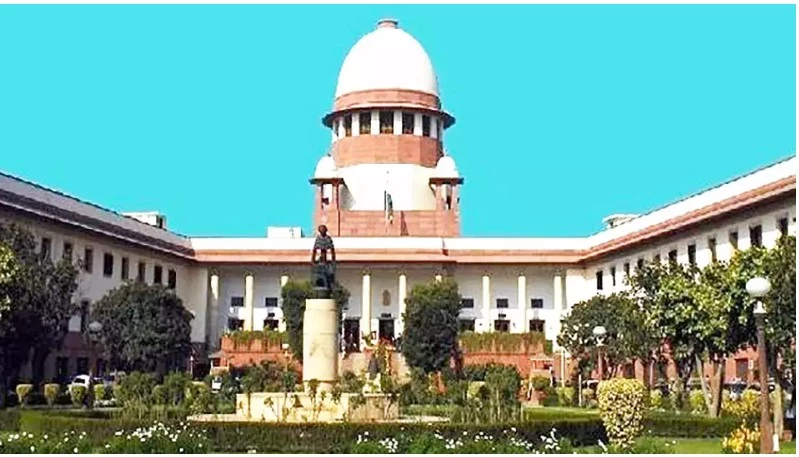Order to scrap Kashmir special status ‘constitutionally valid but temporary', Indian SC rules

Stay tuned with 24 News HD Android App

Four years after Occupied Jammu and Kashmir lost its special status, the Indian Supreme Court on Monday ruled that the BJP government's decision to abrogate Article 370 was constitutionally valid. The apex court also maintained that Article 370 was a temporary provision because of war-like conditions in the region, reported Indian media.
"We hold exercise of presidential power to issue constitutional order abrogating Article 370 of Constitution as valid," Chief Justice of India (CJI) DY Chandrachud said.
While upholding the reorganisation of Ladakh as union territory, the Indian Supreme Court asked the Election Commission to conduct election to the Legislative Assembly of Occupied Jammu and Kashmir by September 30, 2024. "We direct that restoration of statehood in Union Territory of J&K shall be done at the earliest," the CJI said.
Art 370 in J&K | Supreme Court Justice Sanjay Kishan Kaul in a separate but concurring judgement says Article 370 was meant to be temporary pic.twitter.com/0QlkYTleuj
— ANI (@ANI) December 11, 2023
The top court had reserved its verdict on the matter on September 5 following a 16-day hearing. A five-judge Constitution bench headed by Chief Justice DY Chandrachud and including Justices Sanjay Kishan Kaul, Sanjiv Khanna, BR Gavai and Surya Kant heard a batch of pleas challenging the abrogation.
On August 5, 2019, the BJP government had revoked the special status of Jammu and Kashmir granted under Article 370 and split the region into two union territories.
During the hearing, the petitioners had argued that Article 370 could not have been abrogated as it acquired a permanent status following the dissolution of the erstwhile Constituent Assembly of Occupied Jammu and Kashmir in 1957.
The petitioners, represented by a battery of lawyers like Kapil Sibal and Dushyant Dave, said Parliament did not have the authority to declare itself the legislature of J&K for Article 370's abrogation.
Article 370 matter: Supreme Court holds that Jammu and Kashmir became an integral part of India as evident from Articles 1 and 370 of the Constitution of India pic.twitter.com/tUftDj8AVM
— ANI (@ANI) December 11, 2023
Defending its decision, the Centre argued there was no "constitutional fraud" in annulling Article 370 and said the erstwhile state of J&K had fully surrendered its sovereignty to the Union of India upon accession. The Centre said that the petitioners were confusing internal sovereignty with autonomy.
The Centre further said that since Article 370 was repealed, the region saw an "unprecedented era of peace, progress and prosperity".
Indian Home Minister Amit Shah, on August 5, 2019, announced in the Rajya Sabha that the Centre has done away with the special status granted to the erstwhile state of Jammu and Kashmir by modifying the Article 370 of the Constitution.
The same day, the Jammu and Kashmir Reorganisation Bill, which proposed to bifurcate the region into two Union Territories, Jammu-Kashmir and Ladakh, was also passed by the Upper House of the Parliament.
Following Shah’s announcement, up north, several leaders from the Kashmir Valley including National Conference leader Omar Abdullah and People’s Democratic Party chief Mehbooba Mufti were placed under house arrest.
Supreme Court upholds abrogation of Article 370 in Jammu & Kashmir constitutionally valid, asks Election Commission of India to conduct elections to the Legislative Assembly of Jammu and Kashmir by 30 September 2024 pic.twitter.com/ucpOwGTvm9
— ANI (@ANI) December 11, 2023
Communication restrictions were also put in place amid increased security presence during the same time in anticipation of unrest.
Article 370 was incorporated into the Constitution of India granting special status to Jammu and Kashmir owing to the state’s unique circumstances during its accession to India in 1947.
The legislation allowed Jammu and Kashmir to have its own constitution and autonomy over the internal administration. It also limited the legislative powers of the Parliament in the state to defence, foreign affairs, finance, and communications.
According to Article 370, no part of the Constitution, barring Article 1 that declared India as a ‘Union of States’ and the legislation itself, would apply to J&K.
- 'Moral compass' -
One of the advocates who argued for the revocation to be ruled unconstitutional -- the Supreme Court held hearings on it for 16 days -- was sanguine.
"Some battles are fought to be lost," Kapil Sibal posted on X, even before the verdict was read out, saying the court action was intended to ensure that "history must record the uncomfortable facts for generations to know".
"History alone is the final arbiter of the moral compass of historic decisions," he added.
Since the suspension of Article 370 Indian authorities have curbed media freedoms and public protests in a drastic curtailment of civil liberties.
The changes allowed Indians from outside the region to buy land in it, and seek government jobs and education scholarships, a policy denounced by critics as "settler colonialism".
